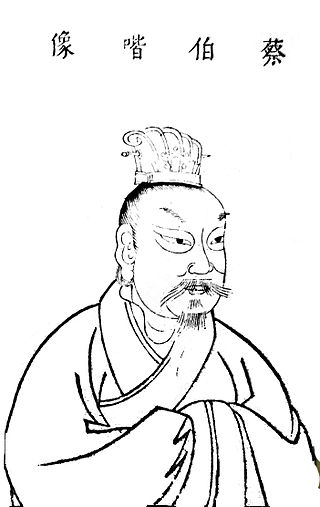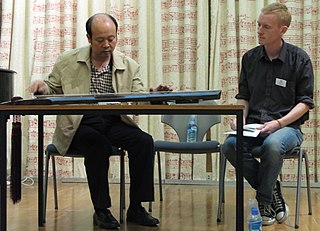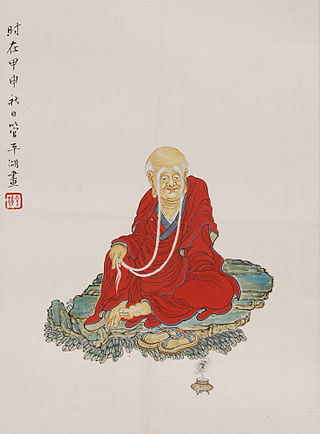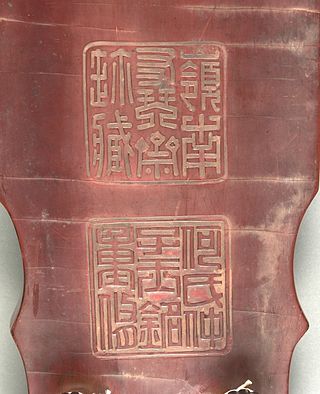
A courtesy name, also known as a style name, is an additional name bestowed upon individuals at adulthood, complementing their given name. This tradition is prevalent in the East Asian cultural sphere, particularly in China, Japan, Korea, and Vietnam. Courtesy names are a marker of adulthood and were historically given to men at the age of 20, and sometimes to women upon marriage.
Ji Kang, sometimes referred to as Xi Kang, courtesy name Shuye, was a Chinese composer, essayist, philosopher, and poet of the Three Kingdoms period. He was one of the Seven Sages of the Bamboo Grove who held aloof from the dangerous politics of third-century China to devote themselves to art and refinement.

The guqin is a plucked seven-string Chinese musical instrument. It has been played since ancient times, and has traditionally been favoured by scholars and literati as an instrument of great subtlety and refinement, as highlighted by the quote "a gentleman does not part with his qin or se without good reason," as well as being associated with the ancient Chinese philosopher Confucius. It is sometimes referred to by the Chinese as "the father of Chinese music" or "the instrument of the sages". The guqin is not to be confused with the guzheng, another Chinese long stringed instrument also without frets, but with moveable bridges under each string.

The ruan is a traditional Chinese plucked string instrument. It is a lute with a fretted neck, a circular body, and four strings. Its four strings were formerly made of silk but since the 20th century they have been made of steel. The modern ruan has 24 frets with 12 semitones on each string, which has greatly expanded its range from a previous 13 frets. The frets are commonly made of ivory or in recent times of metal mounted on wood. The metal frets produce a brighter tone as compared to the ivory frets. It is sometimes called ruanqin, particularly in Taiwan.
The four arts, or the four arts of the Chinese scholar, were the four main academic and artistic talents required of the aristocratic ancient Chinese scholar-gentleman. They were the mastery of the qin, qi, shu and hua, and are also referred to by listing all four: 琴棋書畫; qínqíshūhuà.

Cai Yong, courtesy name Bojie, was a Chinese astronomer, calligrapher, historian, mathematician, musician, politician, and writer of the Eastern Han dynasty. He was well-versed in calligraphy, music, mathematics and astronomy. One of his daughters, Cai Yan / Cai Wenji, was also a famous poet and musician.

Zha Fuxi, also known as Zha Yiping (查夷平) was a leading player and scholar of the guqin. Born in Jiangxi, he started learning guqin in his childhood. In 1936, he co-founded the Jinyu Qin Society (今虞琴社) which later became one of the major national musical organizations for the guqin.

Zeng Chengwei (曾成偉) is a Chinese musician of the guqin, born in the Sichuan province of China. He is a fifth-generation transmitter of the Shu school of qin music, having studied with his maternal grandfather, Yu Shaoze. Zeng is also a well-known maker of the instrument.

Guan Pinghu, was a leading player of the guqin (古琴), a Chinese 7-string bridgeless zither. Born in Suzhou, Jiangsu, Guan came from an artistic family, and started to learn the guqin from his father, Guan Nianci. After the death of his father when he was thirteen, Guan continued with his father's friend Ye Shimeng and Zhang Xiangtao. He also studied with the leading players of three different schools; Yang Zongji (1865–1933), the leading player in Beijing, the Daoist Qin Heming, and the Buddhist monk Wucheng.
The history of the guqin, an ancient Chinese musical instrument, is a long one that spans 3,000 years. Although similar, it should not be confused with another Chinese zither instrument, the guzheng, which has bridges.
The playing techniques of the guqin, sometimes called fingerings, are more numerous than those of any other Chinese or Western musical instrument.

The guqin is a Chinese musical instrument with a long history of being played since ancient times. When the guqin is played, a number of aesthetic elements are involved.
King Zhao of Chu was from 515 to 491 BC the king of the State of Chu during the Spring and Autumn period of ancient China. He was born Xiong Zhen (熊珍) and King Zhao was his posthumous title. Documents unearthed in the former state also show his title as King Shao (卲王). King Zhao was the son of King Ping of Chu.

Duke Huan of Lu, personal name Ji Yun or Ji Gui, was a ruler of the Lu state, reigning from 711 to 694 BC.

The Shu School of Qin Music (蜀派古琴) refers to the modern guqin regional performance style tradition and lineage begun in the mid-19th century by its founder, Zhang Kongshan. The "Shu" name derives from the main base of operations at the time, namely the Sichuan region of China. Today, the Shu School has many branches and lineages, most of which trace their foundation to Zhang Kongshan, though the term is equally applied to Sichuan-based players in general.
Lute Platform is a memorial site located between Guishan and Moon Lake on the southern bank of the Hanshui in Hanyang, Wuhan, Hubei near the Qintai subway station on Line 6, Wuhan Metro and has been listed as a Key Cultural Heritage Site of Hubei Province. It is dedicated to the well-known Chinese story of Yu Boya and Zhong Ziqi, the events of which are said to have taken place during the Zhou dynasty in the vicinity of Lute Platform. First erected in the Song dynasty, Lute Platform has been destroyed and rebuilt numerous times, and was rebuilt again during the 19th century. Scholars Wang Zhong and Huang Pengnian wrote about Lute Platform during the reconstruction work that was carried out in the Qing dynasty.
Yu Shuishan is one of the master contemporary guqin players and contributors. He is a Professor of Architecture in the College of Arts, Media and Design at the Northeastern University, a fourth generation Mei’an School guqin player, and the founder of North America Mei'an Society (北美梅庵琴社).

The Last Goodbye to Mama is a 2021 Chinese drama streaming television series directed by Cao Dun and Jing Chong, and starring Dong Jie, Yin Fang, Lu Fangsheng and Wang Churan. The story revolves around a mother and her son in the little town of Subei, spanning thirty years. It was aired on Youku, IQIYI and Tencent Video from October 13 to November 10, 2021.











